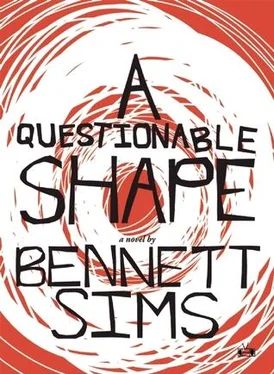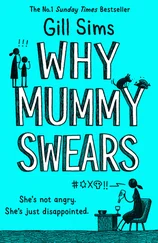This changed after the heart attack. It’s not that they stopped going to films altogether, but that the ritualistic dimension of the afternoons, the self-consciousness of the bonding, grew to be morbid, and oppressive, and distracting for Matt. He was no longer just spending an afternoon with his father at the movies. Privately, in back of his thoughts, he was always spending what might be their last afternoon together at the movies . So if they were to watch The Ring together one Sunday, and if Mr. Mazoch were to suffer a fatal second heart attack the following week, The Ring would go down forever in Matt’s memory as the last movie he saw with his father. Their last conversation together would have been about the haunted videotape in The Ring . One of Matt’s last images of his father’s face would have been of its being bathed in the projector light of The Ring : Ring light gleaming in his father’s eyes, Ring light tinting the gray threads of his shaggy hair. These were the thoughts that Matt was having, these were the things that he was thinking, in that delicate time, he told me. He had no way of knowing then that Mr. Mazoch would live several healthy years beyond the anniversary of his bypass, nor that what would eventually do him in would be, not another heart attack, but— literally no way of knowing this — the walking dead. For the first year after the operation, Matt couldn’t take it for granted from week to week that his father was still alive. In the shower he wondered, Even now, is my father dying? And if at an odd hour he felt his cell phone vibrating against his thigh, that nightmarish ice-water feeling would immediately flood his chest, for he was convinced he was being notified of his father’s death.
They did try going to the movies. They went to The Ring , in fact. But instead of watching the film with his father, Matt watched himself watching the film with his father, trying to carefully stage and frame the mise en scéne of this memory, in case it was his last. He described this watching-himself-watching sensation almost as an out-of-body experience: as if his imagination, detached and astrally projected toward the ceiling of the theater, were looking down on him and his father in their theater seats, filming the memory from an external vantage point. Even as he was ‘in’ the moment with his father, Matt was seeing how he would one day remember the moment with his father. So in a sense he wasn’t in the present moment at all, but already far in the future, viewing the edited-together memory of that moment. It was as if he had managed to transport himself, by an act of self-conscious prolepsis, years ahead of time, skipping beyond his father’s actual death, to the point decades hence when, reminiscing, he would be able to look back fondly on the afternoon that he was even then looking forward from. He could not help seeing his father — who was sitting and breathing right there next to him — through the filter of the future tense, seeing him the way that he would remember him once he was dead. It reminded him, he said, of the experience of visiting a landmark that’s been scheduled to be destroyed, or of touring a monument in a city you know you’ll never revisit: the logic of your self-consciousness petrifies those buildings as already-vanished, already-ruins, already-lost, even as you’re inside them, such that you can never really see them in any present-tense kind of way. Your experience of them becomes mediated by the memory of them that you’re anticipating. This was how his experience of Mr. Mazoch felt mediated, those last afternoons at Citiplace, Matt said. He felt like a tourist to his father’s presence, a sightseer of the monument of his mortality. Which just wasn’t a way he wanted to relate to his father at all.
So they stopped going to Citiplace. At this point I had to interrupt Matt to ask: did he remember the last movie they saw together? Solaris , he said, the Hollywood remake of Tarkovsky’s classic, directed by Baton Rouge’s own Steven Soderbergh.
After Solaris , Matt declared a tacit moratorium on going to the movies. It was simply too charged an activity. The solution that most pleased him was this: since getting coffee together had less baggage as a tradition (since Matt wouldn’t ask himself at a café, ‘Is this the last time I’m going to have coffee with my father?’, or, ‘What if my last memory of my father’s face is of him stuffing it with a poppyseed bagel?’), Mr. Mazoch started inviting Matt, not to the movies, but to grab a coffee, which monthly they would catch up with each other over a couple mugs of, not at the old Barnes and Noble in-store Starbucks by Citiplace, but at Louie’s, a considerably less cathected café. And since Matt still wanted to be able to talk about films with his father, and to have movies (if not movie theaters) continue to play some part in their relationship, he gave Mr. Mazoch, that first Christmas after his operation, a subscription to Netflix. So if they stopped seeing movies together, still they didn’t stop discussing them. Over coffee Matt would ask Mr. Mazoch about the films he’d rented recently, and Mr. Mazoch would ask Matt which films he should rent next. Matt would recommend the movies that meant the most to him (the three-hour Swedish chamber dramas and the whimsical Italian metafictions, the jagged-shadowed German silents and the melancholic French heist films), and for their subsequent meeting Mr. Mazoch would come prepared with capsule reviews: what thrilled him, what bored him, what he felt he didn’t understand. What shot or image or line of dialogue he hadn’t been able to get out of his head all week. ‘What was his favorite?’ I interrupted a second time to ask. Solaris , Matt said again. ‘Really?’ I said. ‘ Solaris ?’ 55Matt nodded, not taking his eyes off the road. He said that Mr. Mazoch had rented Tarkovsky’s version out of curiosity, because he recognized the title and remembered having seen the remake with Matt. And he evidently loved the film enough that he kept on renting it, having Netflix mail him the DVD once every few months, so that he could rewatch it whenever the mood struck. In fact, that was the DVD that Matt found this morning: a copy of Solaris had been slipped inside its red Netflix envelope and discarded on the carpet. It was likely the last movie Mr. Mazoch had watched in mortal life. He had probably been intending to mail it back the very day he got bitten. So the movie that would have been foremost in his mind after reanimating, Matt said, was Solaris .
He said this just as we were arriving at Citiplace, and there could have been no more staggering an anticlimax to Matt’s narrative (after that final detail about the Solaris DVD, whose red envelope at the scene of Mr. Mazoch’s death was meant to seal Matt’s entire argument) than pulling into the whitish salt flats of these vast and vacant parking lots, where you could see, almost at a glance, that the place was utterly deserted. If Mr. Mazoch had been anywhere on the premises — a dark figure marring any inch of that white field — he would have stood out as stark and alien as a man in an Antonioni landscape. But it was clear he wasn’t here. No one was. And as Matt circled the theater in the car, then began insisting that we break inside, it became clear to me that Matt felt betrayed by his absence.
I don’t think Matt was deluding himself about the theater, necessarily. I can see how a site like Citiplace, attended ritually enough over enough weekends, might function for this father and this son the way that a baseball stadium or campground would for others, and I can even see a case being made for Mr. Mazoch’s reanimated corpse returning to it, out of habit if nothing else, and for Matt’s prudence in including it in our itinerary. But after watching Matt grow excited as we approached I-10’s off-ramp, and seeing his disappointment now that we’ve arrived, I find it hard not to think of him as a man grasping at straws. He didn’t just believe that Mr. Mazoch might have returned here: he needed to believe that we’d find him today , on our very first visit. None of the other sites are working out, so Matt is struggling to come up with new ones. After three and a half weeks with no trace of his father (unless you count the traces in Denham, which I am becoming more and more convinced — as I observe him from across the roof — that Matt himself manufactured), he must be starting to ask himself whether he has miscalculated. ‘How well do I really know him?’ he must be asking himself. ‘Do I really know him at all?’ Now that his sense of his father, of where he would return to, is faltering, Matt must be subjecting it to revision. If not Highland Road Park, then Citiplace. And if not Citiplace, then where?
Читать дальше












